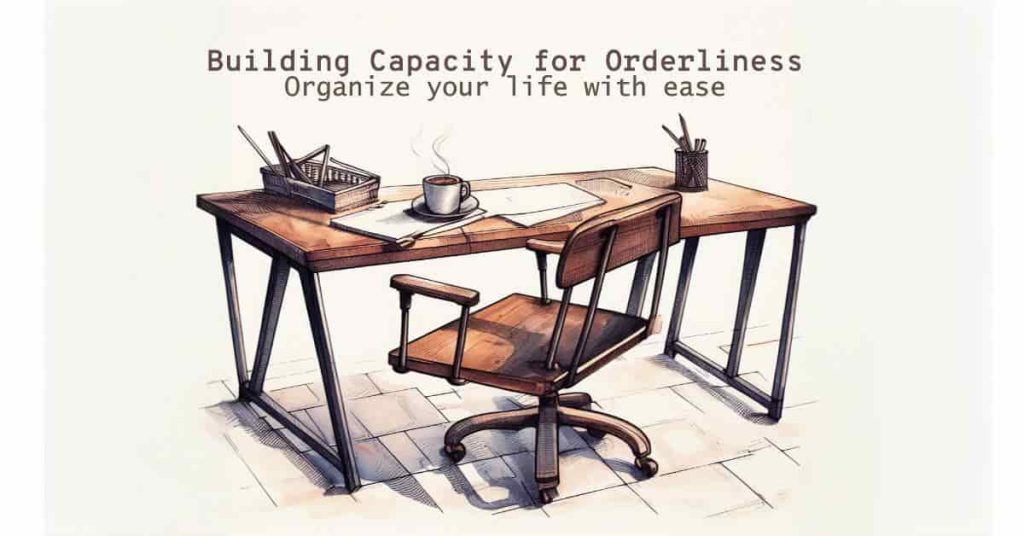
Building Capacity for Orderliness and Organization
Effective leadership begins with an organized mind. Orderliness is the intelligent arrangement of your life’s priorities. It helps you know what’s important now and what can wait. This is often referred to as the “law of sequence,” guiding you to put things in their rightful order, from first to last.
As Sunday Adelaja wisely said, "Without order, you'll just be busy without real results."
Every day, we face the reality that time and energy are limited resources. We can’t do everything at once, so prioritizing becomes essential. Without prioritization, you risk wasting time and creating negative consequences that may take more effort to fix. Once a decision is made, you can’t always control its impact, especially if things go wrong.
Order Leads to Success
The level of success and excellence you achieve is directly linked to how well you organize your life. As Alfred North Whitehead said, “The art of progress is to preserve order amid change and change amid order.” This shows that order is not about rigidity but about adapting to changes in a structured way. It also explains why leadership is not just about holding a position; it’s about taking responsibility for maintaining structure and balance.
It’s your personal responsibility to set your life in order. No one else can do it for you, not even divine help. With discipline, diligence, and determination, you can cultivate an organized mind that leads to growth in all areas—spiritual, emotional, physical, financial, and social.
The Importance of Order in Everyday Life
Order is more than just a habit; it’s a dimension of wisdom. Just like honor, it’s something you must consciously practice. By maintaining order in various aspects of your life, you ensure growth and productivity. A lack of order leads to chaos, confusion, and missed opportunities.
Orderliness is essential for all areas of life:
- Spiritual growth – Prioritize your faith or values to guide your decisions.
- Mental and Emotional health – Stay calm and focused, even when life gets hectic.
- Physical health – Keep your body in check by maintaining good habits.
- Financial and economic success – Develop strategies for saving, investing, and managing resources.
- Social relationships – Build meaningful connections by organizing time for family, friends, and your community.
We are constantly fighting against disorder, as life naturally tends toward chaos. By striving for order, you enhance your productivity, improve your thinking, and create opportunities for growth.
How to Cultivate Orderliness
Building order into your life requires certain key qualities:
- Courage – It takes bravery to face challenges and overcome the forces that try to pull you into disorder. Stay strong, even when things seem overwhelming.
- Knowledge and Wisdom – As the saying goes, "You cannot rise above what you know." The more knowledge and understanding you have, the better equipped you’ll be to manage your life.
- Power and Focus – Success requires focused energy. Without power—whether it’s physical energy, mental sharpness, or emotional strength—it’s impossible to maintain order.
- Strategic Focus – Discipline is painful but necessary. Staying consistent with your goals, no matter the distractions, is key to maintaining order.
- Effective Planning – Planning is the backbone of order. Without it, chaos easily takes over. Set clear, achievable goals and make a roadmap to reach them.
The Benefits of Orderliness
To truly understand the value of order, let’s consider its opposite—disorder. Disorder brings about confusion, stress, losses, and even crises. When things are disorganized, productivity plummets, and you waste time trying to fix preventable problems. On the other hand, order leads to peace of mind, clear thinking, and increased productivity.
Some of the key benefits of order include:
- Safety and security – An organized environment is a safer environment. When things are in order, there’s less risk of accidents, mistakes, or mishaps.
- Peace of mind – Knowing that everything is in its place brings mental clarity and reduces stress.
- Increase productivity – You’ll get more done when your tasks, time, and resources are well-organized.
- Purpose and fulfillment – When life is in order, you’re better positioned to pursue your goals and feel fulfilled.
The Role of Order in Society
Order is not just important for individuals—it’s crucial for organizations, societies, and nations. People naturally migrate to places where there’s more order because it offers stability, control, and predictability. Countries and companies that prioritize order tend to be more successful because they can plan for the future, maintain progress, and foster innovation.
Think about nations that manufacture airplanes versus those that only buy and use them. The nations with the wisdom to create valuable technology are richer and more powerful than those who just purchase it. The same principle applies to people—developing the mindset and skills to generate wealth is far more important than simply having money.
Continuous Quality Improvement for Lasting Order
Maintaining order requires ongoing effort. You can’t just organize things once and expect them to stay that way forever. To sustain order, we need to continually assess and improve our systems, whether it’s in our personal lives or in organizations.
Key Principles for Continuous Quality Improvement:
- Process Focus – Make sure every process is streamlined and effective.
- Customer Focus – Always keep the end-user or stakeholder in mind.
- Data-Based Decision Making – Use facts and evidence to make informed decisions.
- Empowering People – Give individuals the tools and authority to contribute to maintaining order.
- System-Wide Thinking – Consider how all parts of a system work together and how they impact one another.
Models for Continuous Improvement
There are various models to guide continuous improvement:
📌 PDSA (Plan, Do, Study, Act) – Plan your changes, implement them on a small scale, study the results, and act on what you’ve learned.
📌 Six Sigma – Define, measure, analyze, improve, and control processes to reduce errors and improve efficiency.
📌 TRIP Model – Engage stakeholders, educate people, execute plans, measure progress, embed successful processes, and scale up.
The Cost of Disorder
If we fail to maintain order, the cost of fixing problems later will always be higher. Systems that work well do so because there are dedicated people maintaining them. The effort you put into creating order now will save you from future losses, confusion, and inefficiencies.
Reference
Dr.Joshua Kolawole (MD, MBA, MASc., FISQua, CPHQ, PMP) Agile Program Manager & Transformational Leadership Expert, Valdymas Intelligence LLC, Grand Prairie, Texas, USA.



